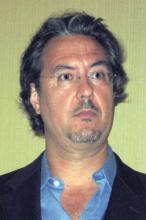ORLANDO – The randomized trials evidence supporting a positive clinical effect for medical marijuana in relieving symptoms of multiple sclerosis is strongest for improvement of pain, patient-reported spasticity, and sleep disturbances.
That’s the clear message from an analysis of the 19 published, reasonable-quality randomized trials of cannabis use in patients with MS, Dr. Allen C. Bowling reported at the fifth Cooperative Meeting of the Consortium of Multiple Sclerosis Centers and the Americas Committee for Treatment and Research in Multiple Sclerosis.
"That’s consistent with my personal observation in a state where we’ve had medical marijuana for 12 years and where recreational marijuana was approved in last November’s election. The most consistent effect my patients report is on nocturnal pain and/or spasticity, which is consistent with the results of the clinical trials. The patients typically use a little bit at bedtime," according to Dr. Bowling, medical director of the MS service and director of the complementary and alternative medicine service at the Colorado Neurological Institute, Englewood.
The evidence that medical marijuana is of benefit for the bladder dysfunction associated with MS is weaker: Of 9 clinical trials that included bladder dysfunction as an endpoint, 4 were positive, 5 negative.
Occupying the bottom tier in terms of evidence-based therapy are objectively measured spasticity and tremor. Of 13 clinical trials that incorporated objective, clinician-assessed spasticity as an endpoint, only 2 were positive, with 11 negative. And none of the 5 decent-quality randomized trials that examined medical marijuana for relief of tremor in MS patients was positive.
In contrast, 9 of 11 studies that looked at pain as an endpoint reported a positive effect. Of 13 studies with patient-reported spasticity as an endpoint, 9 were positive, 4 negative. And of 6 randomized trials with sleep quality as an endpoint, 5 were positive, 1 negative, noted Dr. Bowling, who is clinical professor of neurology at the University of Colorado, Denver.
Medical marijuana is now legal in 18 states and the District of Columbia.
The largest and in Dr. Bowling’s view one of the best-conducted randomized trials in the field was the multicenter U.K. CAMS trial. The 15-week study included 630 MS patients who were randomized to oral tetrahydrocannabinol (Marinol); Cannador, an oral capsule containing a standardized amount of whole-plant extract; or placebo. The investigators found no significant difference between the cannabis-based therapies and placebo in improving spasticity as objectively measured using the Ashworth score, which was the primary study endpoint. However, the two active treatment arms did show significant benefit in terms of the secondary endpoints of improvement in pain, self-reported spasticity, and sleep (Lancet 2003;362:1517-26).
Another speaker at the session on prescribing medical marijuana underscored the beneficial effect on sleep disruption.
"In every single population – whether it’s Crohn’s disease, epilepsy, HIV, noncancer pain, cancer pain – improved sleep is always one of the most robust outcomes patients report. This is something that in clinical practice we tend to push to one side. We have some medications for pain management that we sometimes use for sleep, but cannabis use at nighttime seems to be a very powerful agent to improve sleep quality," observed Dr. Mark F. Ware, a family physician and anesthesiologist who is director of clinical research at the Alan Edwards Pain Management Unit of McGill University in Montreal.
Dr. Bowling estimated that roughly 80% of his MS patients have little or no interest in medical marijuana. Those who are using it span a spectrum ranging from patients who were recreational users of pot before their MS diagnosis and who now seek beneficial MS effects or simply a license to use it recreationally, to elderly individuals with no history of marijuana use who have found cannabis is the only thing that effectively relieves some of their symptoms.
The neurologist noted two glaring paradoxes that emerged from his review of the clinical trials literature on medical marijuana for MS. One is that only 2 of the 19 studies utilized smoked marijuana, even though it’s far and away the most readily available form of the agent for U.S. patients. The most widely studied agent nabiximols (Sativex), an extract formulated as an oral spray – is approved as a prescription drug in Canada, the United Kingdom, and other countries, but not in the United States. And while Marinol and oral nabilone (Cesamet) are approved by the Food and Drug Administration, they’re not widely prescribed.
"I find it particularly challenging to apply the medical literature in this area to clinical situations. In our clinical practice, the way it seems to work out best is for patients to experiment on their own with marijuana as a prn add-on to their spasticity and/or pain medications, especially at bedtime or, if symptoms are worse, in the afternoon. But the dose, frequency, formulation, quality control ... it’s a real challenge. It’s like there are parallel universes of care, where we’re prescribing the conventional medications, and then we find out that the patients are also using marijuana," Dr. Bowling said.



